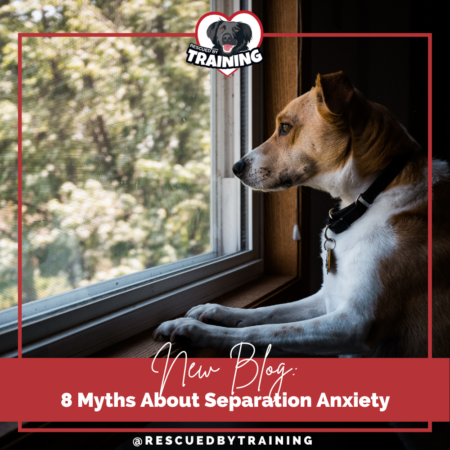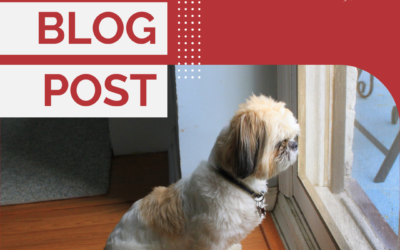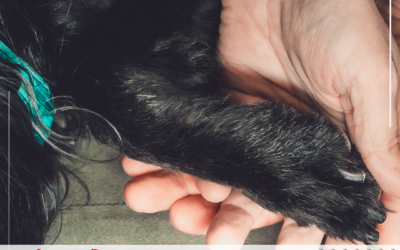When I have my initial consult with separation anxiety clients, most, if not all of them, have some misguided understanding or belief about separation anxiety. And with all the widely found information online and given from friends, it’s easy to see why people come across so much wrong information. It’s not your fault. Dog training is completely unregulated in the US, so there’s no standards of care or protocol. My free guide, 5 Suggestions That Won’t Help Separation Anxiety (and might make it worse) helps address many of those commonly given pieces of advice and explains why they don’t help and might make things worse.
Here are 8 Common Myths about separation anxiety:
- You caused your dog’s separation anxiety by spoiling them. Friends and family love to try to guilt you on this one so let me be really clear. You didn’t cause your dog’s separation anxiety. We don’t know what causes separation anxiety exactly but we do know that you didn’t cause it. Perhaps there’s a genetic component or some other underlying reason, but you definitely didn’t cause it because you let your dog sleep with you or because you didn’t let your puppy cry it out.
- Your dog is behaving out of spite. This just isn’t true. Dogs don’t have the emotional depth for things like spite and guilt. If your dog has separation anxiety, they’re not being spiteful – they’re having a panic attack and need your help.
- Only rescue dogs get separation anxiety. Not true. Any dog – any breed, any age – can have or develop separation anxiety. If there seems to be a higher prevalence with certain breeds, it’s likely because that breed is popular at the time. (Sort of like why the higher dog bite breed is labs – they’re just a popular breed so there’s more of them out in the world than other breeds!)
- Your dog will grow out of it. Letting your puppy, or any dog, “cry it out” is not the solution and it could make it worse. Dogs don’t grow out of separation anxiety. They need help overcoming it with training and often, medication.
- If your dog has separation anxiety, he won’t eat when he’s alone. This is a common one and alone time anorexia can sometimes be an indicator of sep anx but not always. Different dogs handle anxiety in different ways, just like humans, How many people do you know can plow through a pint of ice cream when they’re anxious while others can’t think about eating a thing? Dogs too. Some dogs will eat when they’re stressed while others won’t touch even the yummiest of steaks.
- If your dog follows you around all the time when you’re home, then he has separation anxiety. “Velcro dogs” as these dogs are often called, can have separation anxiety but when this was studied (Flannigan, Gerrard, and Nicholas H. Dodman. “Risk factors and behaviors associated with separation anxiety in dogs.” Journal of the American Veterinary Medical Association 219.4 (2001): 460-466.) 64% of the dogs studied who DIDN’T have separation anxiety shadowed their owners. Dogs are social creatures – they want to be near us. Having a Velcro dog doesn’t necessarily mean they have sep anx.
- If you let your dog sleep in bed with you, it will cause separation anxiety. The actual causes of separation anxiety are not entirely known but many dogs sleep with their owners (again, dogs are social – they want to be near us and our beds are comfy!) who do not have separation anxiety. You will not cause sep anx by snuggling with your dog. I promise! In fact, it might improve your relationship!
- Leaving your dog with a t-shirt (or a fake mannequin dressed in your clothes) will help. Your dog is smart enough to know the difference between you, a living human being and a mannequin. Also, your home smells like you all over the place. You don’t need a specific piece of clothing to remind your dog of what you smell like. But more importantly, if your dog has separation anxiety, your dog isn’t anxious he doesn’t smell you. He has a panic attack because he’s being left alone.
If you and your dog are struggling with alone time anxiety, there is help. Separation anxiety can be treated. For more information on separation anxiety check my page here. And you can grab my self-paced Separation Anxiety Foundations Course here. You can also download some free separation anxiety resources here. If your dog has separation anxiety, you both deserve some relief, so schedule your initial assessment today!
Happy training!
![]()




